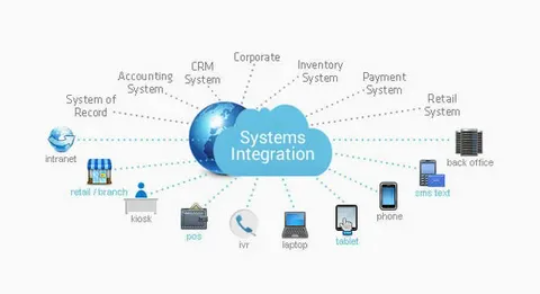
The benefits of IT system integration Dubai for companies go far beyond just connecting software and hardware. In today’s fast-paced business world, companies need systems that talk to each other, share data instantly, and work seamlessly. Without integration, departments work in silos, processes slow down, and errors increase.
In Dubai’s competitive corporate landscape, businesses invest heavily in IT infrastructure. However, without proper integration, even the best systems fail to deliver maximum value. IT system integration aligns different technologies, automates workflows, and ensures smooth data exchange across departments. This leads to higher efficiency, improved decision-making, and better customer satisfaction.
Why IT System Integration Matters in Dubai’s Business Environment
Dubai has positioned itself as a global business hub. Companies here operate in industries like finance, logistics, real estate, healthcare, and technology. Each sector relies on multiple systems—ERP, CRM, HR management tools, accounting software, and communication platforms.
Without integration, employees waste hours switching between platforms, manually entering data, and trying to locate information. IT system integration solves these problems by connecting all platforms into a single, unified framework. This approach not only speeds up work but also enhances accuracy and collaboration.
Key Benefits of IT System Integration Dubai for Companies
1. Streamlined Business Operations
One of the most significant benefits is operational efficiency. Integration ensures that data flows seamlessly from one system to another. For example, when a sales representative closes a deal in the CRM, the information instantly updates in the accounting and inventory systems.
This eliminates duplicate data entry, reduces human error, and frees up employees to focus on high-value tasks rather than administrative work.
2. Improved Decision-Making
Companies thrive when leaders have access to accurate, real-time data. With IT system integration, decision-makers can view combined reports from different departments in one dashboard.
Instead of waiting days for separate reports, managers can see sales trends, inventory levels, and customer feedback instantly. This speeds up strategic planning and ensures better business outcomes.
3. Enhanced Customer Experience
In today’s market, customer experience can make or break a business. Integration allows companies to respond faster to customer queries, resolve issues quickly, and offer personalized services.
For example, when customer data from the sales, marketing, and support teams is integrated, the company gains a complete view of the client’s journey. This enables personalized offers, timely follow-ups, and improved satisfaction rates.
4. Cost Savings
Manually transferring data between systems consumes both time and money. It also increases the risk of costly mistakes. IT system integration reduces these inefficiencies, helping companies save resources.
Additionally, integrated systems require less maintenance compared to multiple standalone platforms. This translates into lower IT costs over time.
5. Increased Employee Productivity
Switching between different tools throughout the day drains time and energy. With a fully integrated system, employees can access all necessary tools and data from one platform.
This reduces frustration, improves morale, and allows staff to focus on more meaningful tasks that drive growth.
6. Scalability for Growing Businesses
Dubai’s market is dynamic, and companies often expand their operations. IT system integration makes scaling easier because new tools or platforms can connect seamlessly with existing systems.
This flexibility allows businesses to grow without worrying about technology bottlenecks.
7. Stronger Data Security
When systems operate in isolation, security protocols may differ, leaving gaps that hackers can exploit. Integration centralizes security measures, making it easier to monitor and protect sensitive information.
Companies in regulated industries benefit the most from this, as it ensures compliance with data protection laws.
Common Scenarios Where IT System Integration Helps
- Retail businesses linking point-of-sale systems with inventory and accounting.
- Logistics companies integrating tracking software with customer portals.
- Healthcare providers connecting patient management systems with billing and pharmacy databases.
- Real estate agencies syncing CRM platforms with marketing tools for property listings.
Steps to Achieve Successful IT System Integration in Dubai
1: Assess Current Systems
Identify all existing tools, platforms, and workflows. Understand how data moves between departments.
2: Define Integration Goals
Decide what you want to achieve—faster operations, better reporting, or improved customer service.
3: Choose the Right Integration Method
Options include APIs, middleware, or custom-built solutions. The choice depends on your budget, timeline, and complexity of systems.
4: Partner with Experienced Providers
Work with IT experts in Dubai who understand local business needs and have experience integrating diverse systems.
5: Train Your Team
Ensure employees know how to use the new integrated system to maximize benefits.
Challenges in IT System Integration and How to Overcome Them
- Compatibility Issues – Use middleware or updated APIs to bridge gaps.
- Data Quality Problems – Clean and standardize data before integration.
- Resistance to Change – Offer training and highlight benefits to staff.
- Budget Constraints – Start with priority integrations and scale gradually.
Long-Term Impact of IT System Integration in Dubai
Companies that invest in integration enjoy sustainable growth. They adapt faster to market changes, launch new products quickly, and provide better customer service.
In Dubai’s fast-evolving economy, staying ahead means leveraging technology effectively. Integration ensures that every part of the business works together as a single, efficient unit.
Final Thoughts
The benefits of IT system integration Dubai for companies are clear—faster operations, better decisions, happier customers, and lower costs. In a city that thrives on innovation and speed, integration is no longer optional.
Businesses that embrace it gain a competitive edge, improve efficiency, and position themselves for long-term success. By partnering with the right IT experts in Dubai, companies can create a technology ecosystem that supports growth today and in the future.

